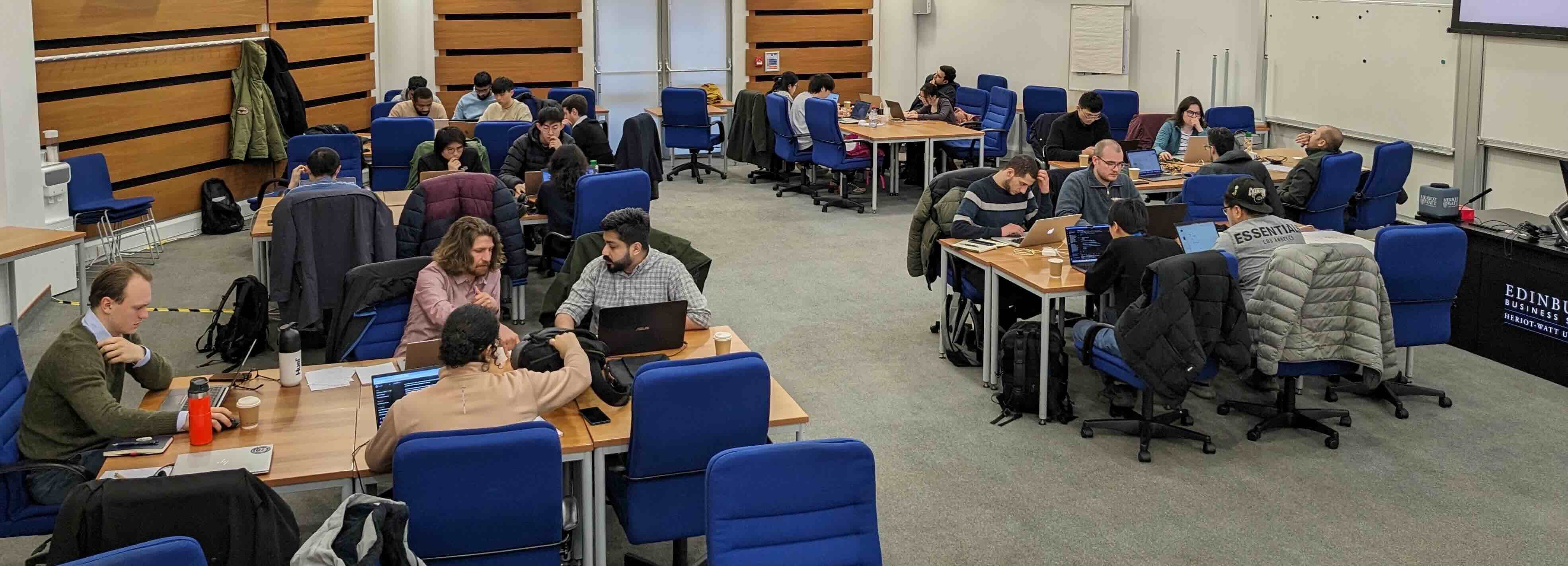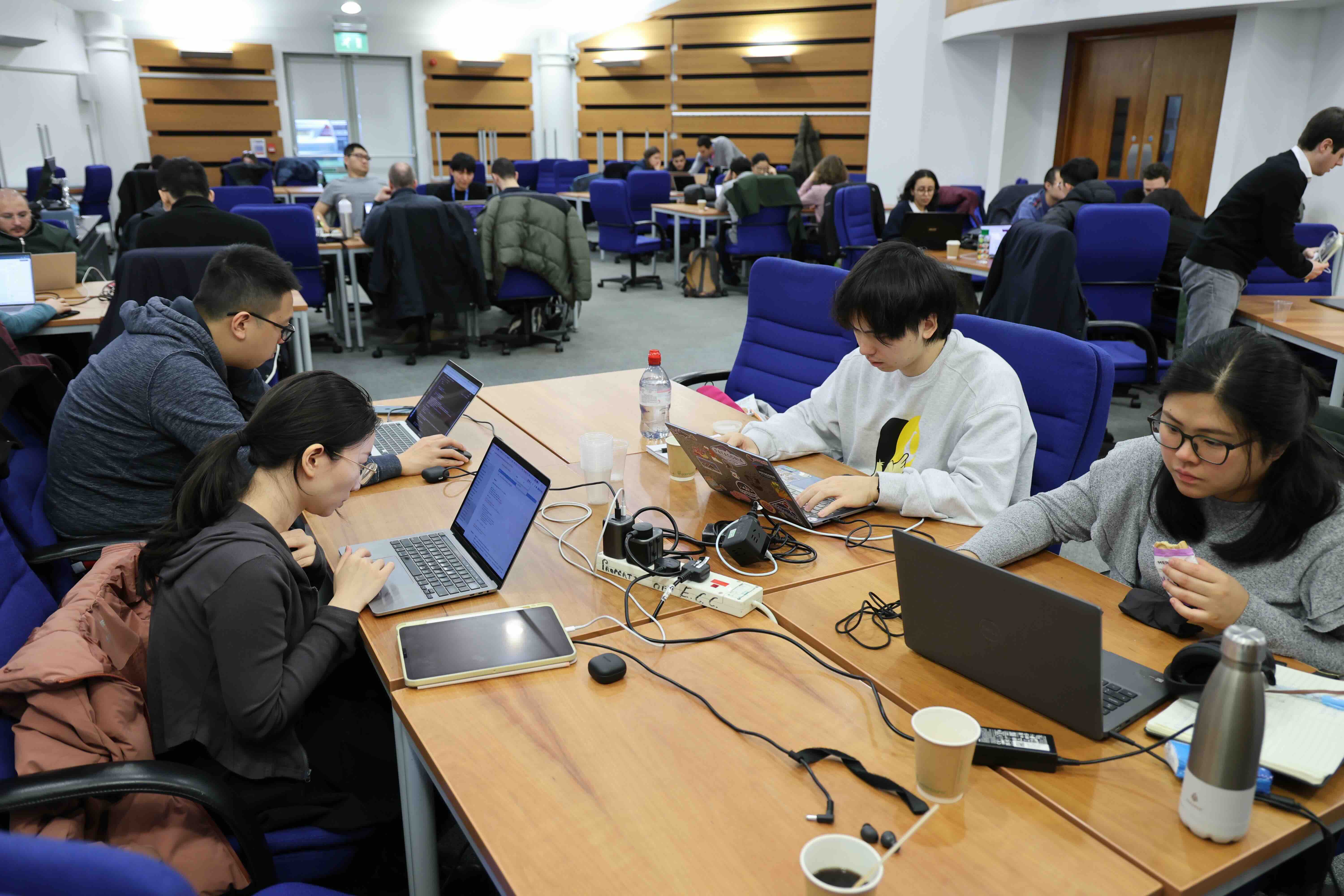
ECO-AI Hackathon: AI-Driven Solutions for Carbon Capture and Storage
PhD students and PDRAs from across the UK joined forces to innovate and collaborate on exploring AI for NetZero approaches. Over the course of three days, they were challenged to work on unique problems related to carbon capture and storage (CCS), and its economics and policy implications. They were provided with the tools, support, and data needed to write new codes and study current challenges in material discovery using AI, subsurface flow modelling using AI, and uncovering progress by abstract clustering of CCS patents using AI.
Participating researchers received informative workshops and mentorship from Heriot-Watt University (HWU) and Imperial College London (ICL) experts working within the ECO-AI project.
Event Details
Dates: Wednesday 13 March – Friday 15 March 2024
Location: Heriot-Watt University, Edinburgh, UK
Venue: Scott Suite, Edinburgh Business School
This was a two-part event. Participants were invited to attend an AI workshop on CCS and the ECO-AI project on 11 & 12 March. This led into the Hackathon where participants had the option to compete in one of three tracks:
- Machine learning for encoding and decoding of molecules with the aim of designing a powerful decoder that produces valid structures.
- Machine learning for prediction of dissolution in porous media flow.
- Machine learning for clustering of CCS patents.
Event Flow
- Attend 2-day AI workshop on CCS.
- Form teams and select challenge track.
- Collaborate on solutions over 3-day hackathon.
- Demo solutions to experts from industry and academia.
This Hackathon allowed participants to collaborate with peers from outside their own institution and to network with the workshop participants. At the end of the Hackathon, teams had the chance to demonstrate their work to data scientists within the ECO-AI project and industry experts attending the workshop.
Who Attended
The hackathon was attended by PhD students and early career researchers interested in AI applications in environmental sciences, particularly those focusing on CCS technologies. It was an excellent opportunity for anyone eager to contribute to the global effort in reducing carbon emissions through innovative AI-driven solutions.
Background & pre-reading
All participants were expected to possess basic knowledge of Python and some ML tools (e.g., Scikit-learn, PyTorch). For those who were not familiar with these tools, pre-reading on how to use basic Python, NumPy, Pandas, Scikit-learn, and PyTorch using the following resources was recommended:
- Enthought Numpy Tutorial - SciPyConf 2023
- University of Washington Machine Learning with Python Course
- PyTorch Tutorials
Teams & presentations
Team Aspririn (CO2 Capture)
- Luis Carvalho, University of Aberdeen
- Charlotte Breakwell, Imperial College London
- Evangelos Tsochantaris, Heriot Watt University
- Kieran Nehil-Puleo, Vanderbilt University
Team Autobots (CO2 Capture)
- Abu Abu-Eyo, University of Aberdeen
- Rohit Murali, University of Surrey
- Amin Zarei, University of Surrey
- Thomas Bernet, Imperial College London
- Minghui Ye, Heriot-Watt University
Team Gen A (CO2 Capture)
- Yongliang Yan, Newcastle University
- Griffin Gui, Heriot Watt University
- Florian Baakes, Imperial College London
- Alhasan Abdellatif, Heriot Watt University
Guardians of Carbon (CO2 Storage)
- Muhammad Ali, Heriot-Watt University
- Weilun Xu, Imperial College London
- Nathalie Pinheiro, Imperial College London
- Marcos Cirne, Heriot Watt University
Minus CO2 (CO2 Storage)
- Reza Najafi, Heriot-Watt University
- Judongyang Zhou, Imperial College London
- Xin Yee Tai, University of Surrey
- Yuanjing Zhao, University of Surrey
- Boyang Chen, Imperial College London
Carbon Hackers (CO2 Storage)
- Donghu Guo, Imperial College London
- Rui Li, University of Aberdeen
- Farah Rabie, Heriot-Watt University
- Jack LI, University of Edinburgh
- Vitaly Starikov, Heriot-Watt University
P-Clusters (CCS Policy & Economics)
- Victor Rosenberg, Heriot-Watt University
- Matthew Arran, British Geological Survey
- Elsy Milan, Imperial College London
- Nouha Samlani, Teesside University
Hackathon Agenda:
| Date | Time | Session |
|---|---|---|
| Wednesday 13th | 09:00 - 12:00 |
|
| 12:00 - 13:00 | Lunch & coffee | |
| 13:00 - 17:00 |
|
|
| Thursday 14th | 09:00 - 12:00 |
|
| 12:00 - 13:00 | Lunch & coffee | |
| 13:00 - 17:00 |
|
|
| Friday 15th | 09:00 - 12:00 |
|
| 12:00 - 13:00 | Lunch & coffee | |
| 13:00 - 16:00 |
|
Contact Us
If you have any questions about the event, please contact ECO-AI project manager
Hackathon photos
